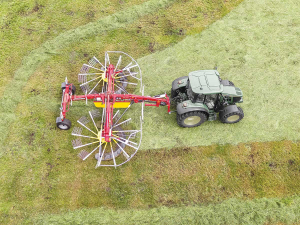Pöttinger launches silage additive tank for loader wagons and balers
Pottinger has released details of its newly developed LIQUIDO F front-mounted, multi-purpose silage additive tank.
 Pottinger engineers tested various materials and selected a special plastic (PE1000) for the glide bar.
Pottinger engineers tested various materials and selected a special plastic (PE1000) for the glide bar.
First seen as an option in its linkage mounted rotary swathers, Pottinger has now released the Flowtast glide bar as an option for its TOP 842 C centre-delivery rake.
The rake offers a working width of 7.7 to 8.4 metres. Replacing the conventional jockey wheels, Flowtast creates a larger area of contact to improve load-bearing capacity on wet, peaty soils, it says.
Working in conjunction with a hydraulic cylinder to alleviates the weight of the TOP 842 C rotor unit, results in a low ground pressure of about 200kg, protects soil and the glide bar as well as wear and tear on the machine’s frame.
Pöttinger engineers tested various materials and selected a special plastic (PE 1000) for this application.
It says this synthetic material possesses an enormous resistance to wear and abrasion. Each glide bar consists of five individually exchangeable 15mm thick plates. To provide perfect ground tracking and tine guidance, the glide bar is installed close to the tines. It tracks the ground along the full raking length of the tine arc. The sickle shape bar also offers the best gliding properties during sideways movements.
The Floatast is wear and abrasion resistance with each bar consisting of five, individually exchangeable 15mm thick plates. To aid ground tracking and tine guidance, the glide bar is installed close to the tines, offering ground tracking along the full raking length of the tine arc. The sickle shape bar also offers the best gliding properties during sideways movements
First presented at Agritechnica 2019 in Hanover, Germany last year, the option is said to take over when wheeled assemblies reach their limits, for example, on wet, peaty soils with deep wheel marks, or when working with whole crop forage in fields where the sward does not provide full surface cover.
The World Wide Sires National All Day Breeds Best Youth Camp Best All Rounder plaudit has become family affair, with 2026 Paramount Cup winner Holly Williams following in her sister Zara's footsteps.
DairyNZ is giving New Zealand farmers a unique opportunity to gain hands-on governance and leadership experience within the dairy sector.
Herd improvement company LIC has posted a 5.2% lift in half-year revenue, thanks to increasing demand for genetics.
According to the latest Fresh Produce Trend Report from United Fresh, 2026 will be a year where fruit and vegetables are shaped by cost pressures, rapid digital adoption, and a renewed focus on wellbeing at home.
The Roar is a highlight of the game hunting calendar in New Zealand, with thousands of hunters set to head for the hills to hunt male stags during March and April.
OPINION: The past few weeks have been tough on farms across the North Island: floods and storms have caused damage and disruption to families and businesses.
OPINION: Fonterra may be on the verge of selling its consumer business in New Zealand, but the co-operative is not…
OPINION: What does the birth rate in China have to do with stock trading? Just ask a2 Milk Company.